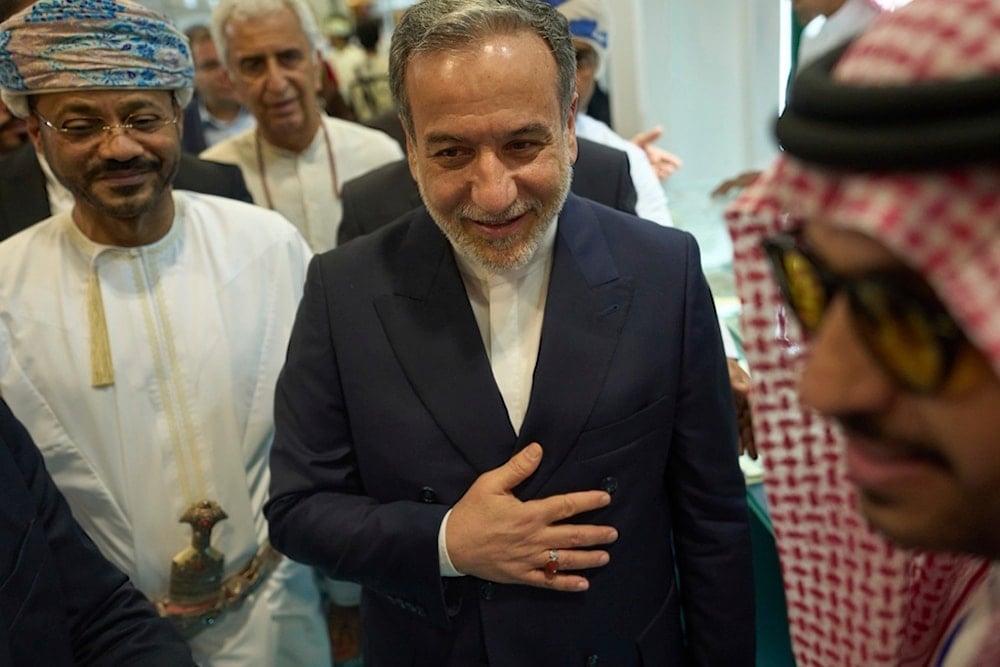Iran denies rumors about talks with US, says no date set
Iran’s deputy foreign minister says no indirect talks with the US are scheduled, calling recent reports "unfounded" as Tehran weighs its national interests.
-

Iranian Foreign Minister Abbas Araghchi, center, and Omani Foreign Minister Badr al-Busaidi, left, walk through the Muscat International Book Fair in Oman, Friday, April 25, 2025 (AP)
Iranian Deputy Foreign Minister for Political Affairs, Majid Takht-Ravanchi, affirmed on Sunday that no date has been set for indirect talks with the United States, dismissing media reports on the matter as "baseless speculation."
Takht-Ravanchi’s comments come in response to growing rumors suggesting that Tehran and Washington could soon resume dialogue, especially in light of recent US statements following the cessation of the Israeli aggression on Iran.
Just days earlier, Iranian Foreign Minister Abbas Araghchi stated that a return to talks with the US is under review and would be determined based on Iran’s national interests.
He emphasized that talks, in principle, are neither sacred nor taboo. “Talks do not necessarily mean reaching an agreement; they are a process evaluated through a cost-benefit analysis and aligned with higher national interests,” Araghchi said. He added that any potential return to the negotiating table would require clarity about the format and framework of the talks, noting that “the circumstances have completely changed.”
Meanwhile, following the declared ceasefire between the Israeli regime and Iran, the US State Department had claimed the environment was now favorable for reviving nuclear discussions with Tehran.
Araghchi outlines post-war nuclear diplomacy
In a televised interview with Iranian broadcaster SNN TV, Araghchi asserted that both the United States and "Israel" had mobilized their nuclear capabilities and coercive strategies to force Iran into submission, but ultimately failed.
Araghchi praised the Iranian people’s steadfastness, describing it as a “historic symbol of resistance” during a critical national moment, emphasizing that despite years of sanctions, threats, and failed negotiations, the Iranian nation remained united in defense of its nuclear rights.
“Neither pressure nor diplomacy deprived us of our legitimate rights,” Araghchi declared.
The minister criticized US President Donald Trump’s "maximum pressure" campaign, describing it as marked by mixed messages, threats coupled with calls for dialogue.
While Iran rejected direct talks with Washington, Araghchi noted that Tehran was considering indirect negotiations under new conditions. After diplomatic efforts failed to impose US terms, Araghchi accused Washington of unleashing "the Zionist enemy to commit hostile acts," which he described as a betrayal of diplomacy.
Iran’s response to military strikes and diplomatic breakdown
In his interview, Araghchi stressed that diplomacy following the recent war would differ sharply from previous efforts, warning that "Future international relations will reflect how each country behaved during the crisis."
He noted that the Atomic Energy Organization of Iran (AEOI) is currently conducting technical assessments of damage caused by the strikes, describing them as “serious and extensive.” Meanwhile, Iran's Foreign Ministry has tasked its international affairs division with identifying the aggressors and seeking compensation through the United Nations.
“Reparations are now a key component of Iranian diplomacy,” he added.
The minister urged European countries, particularly Germany and France, to uphold their stated commitment to international law, issuing a stark warning to France and the UK, both permanent members of the UN Security Council, against triggering the snapback mechanism that would reinstate UN sanctions on Iran.

 3 Min Read
3 Min Read








